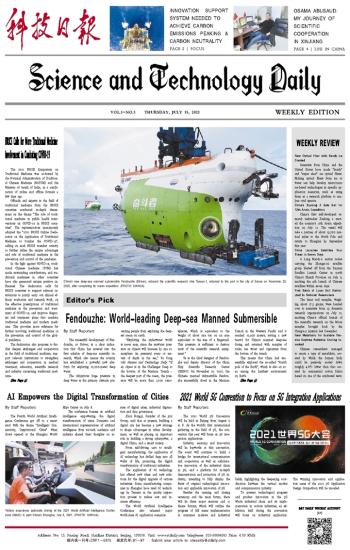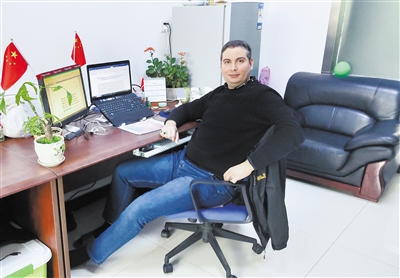
 Innovation Support System Needed to Achieve Carbon Emissions Peaking and Carbon Neutrality
Innovation Support System Needed to Achieve Carbon Emissions Peaking and Carbon Neutrality My Journey of Scientific Cooperation in Xinjiang
My Journey of Scientific Cooperation in Xinjiang BRICS Calls for More Traditional Medicine Involvement in Combating COVID-19
BRICS Calls for More Traditional Medicine Involvement in Combating COVID-19 Fendouzhe: World-leading Deep-sea Manned Submersible
Fendouzhe: World-leading Deep-sea Manned Submersible WEEKLY REVIEW
WEEKLY REVIEW AI Empowers the Digital Transformation of Cities
AI Empowers the Digital Transformation of Cities 2021 World 5G Convention to Focus on 5G Integration Applications
2021 World 5G Convention to Focus on 5G Integration Applications S&T DAILY WECHAT ACCOUNT (EN)
S&T DAILY WECHAT ACCOUNT (EN)
 |
| Dr Osama Abusaud, Egyptian Talent Young Scientist working as an Associate Professor at Xinjiang Institute of Ecology and Geography, Chinese Academy of Sciences. (PHOTO: Osama Abusaud) |
My story with China started in 2008, when I decided to travel to the country to pursue my doctor's degree at Northwest A&F university, supported by the China Scholarships Council. In July 2012, after receiving my degree I returned to Egypt, but have never forgotten the important dates of Chinese festivals and have regularly kept in touch with all my Chinese friends via WeChat, a social media app.
During my stay at the National Research Council of Italy (CNR), one of my Chinese classmates Dr. Li Li, who is working now at Xinjiang Institute of Ecology and Geography, Chinese Academy of Sciences (CAS), introduced me to her group leader Dr. Li Wenjun. He is an internationally recognized scientist in the field of microbiology. Dr. Li Li helped me to apply for the Talented Young Scientific program provided by China's Ministry of Science and Technology (MOST) .
In 2014, the MOST offered me a position on the Talented Young Scientific program hosted by the MOST and the Key Laboratory of Biogeography and Bioresource in Arid Land of the Xinjiang Institute of Ecology and Geography. I was the first Egyptian and African to be offered the position from the MOST .
Going to Xinjiang was a big challenge for me due to the cold weather. I had never imagined before that I could live in such a cold area so far from the center of China. However despite my doubts I made the decision to go as I had old friends there. I was quite sure I would get their kind support and understanding. After arriving in the region's capital of Urumqi, I went on to make many new friends from different ethnic groups. In fact, Xinjiang is a fascinating and unique area, in which there is a blend of many cultures and languages. It is a very safe and convenient place to live in and the hospitality shown to foreigners is unbelievable.
In 2017, I was officially invited to the opening ceremony of Belt and Road Forum, where I represented foreign Talented Young Scientists in China and was also officially invited to attend the "World Youth Forum" held at Sharam El Sheikh, Egypt, where I was a representative of the Egyptian Talented Young Scientists in China.
In addition, I was awarded with the title of "The Excellent Foreign Expert of Xinjiang Branch, CAS" in February 2018. I was also awarded an honorary credential from the Xinjiang Institute of Ecology and Geography (XIEG) for my contribution to the International Collaboration in the "Belt and Road Initiative," and received an international partnership award for a Talented Young Scientist of CAS in 2019. The following year the Xinjiang local government presented me with the Tian Shan Award of the Xinjiang Uygur Autonomous Region.
Five years of working in Xinjiang have expanded my horizons, both academically and personally. I have learned that when you work closely with a group of people, they become like family. I have worked with some good research associates, as well as all-around good people since I started working in China, thus I have embraced the culture.
Thanks to the Chinese government ,I was given this opportunity to study and work with Chinese scientists. I can say without any doubt that China has given me a well-rounded experience. The more I have done, the more I realized that this was the place for me. Studying and working in China has changed part of who I am. I had to stop being an introvert and become a person who will stand in the spotlight and face the responsibility of having a story with my name on it.
During my research work with young Chinese scientists in China, I have published more than 36 SCI research articles and two book chapters under the guidance of my group leader Dr. Li Wenjun in high impact factor journals. In addition, my H-index reached 13 and the total citations of my documents reached 500 articles.
Regarding Chinese science and technology in my eyes, over the past years, China has adopted a range of policies designed to create "indigenous innovation". So now I find many Chinese products which are equal in quality to same international brands.
In recent decades, by attracting international researchers from developing countries to study or work in China, it has consistently formed a key part of the country's push to gain international prominence in science and technology and thus power long-term economic growth. Therefore, launching more international sci-tech cooperation and people-to-people exchange platforms for the youth is needed now under the Belt and Road Initiative, such as offering more scholarships for master and doctoral degrees. In addition, more programs for post doctorate and visiting scholars are required from Chinese institutions.
It is common knowledge that science drives development and innovation which can transform the world. China is implementing a strategy of innovation-driven development and promoting comprehensive innovation with science and technology as the core. I hope that China will strengthen collaboration with international partners and actively engage in the global innovation network to address common challenges and realize common development with people across the world, especially in Africa and the middle east, under the umbrella of the Belt and Road Initiative. More efforts are needed to address these challenges through increased support of academic exchanges between young Chinese scientists and foreign scientists within the framework of international projects.
Looking ahead, I hope in near future to get the opportunity to achieve my dream of establishing a joint lab center between Arish University in Egypt and Chinese Academy of Science.
Dr Osama Abusaud is an Associate Professor at Xinjiang Institute of Ecology and Geography, Chinese Academy of Sciences. The views don't necessarily reflect those of the S&T Daily.

 Next
Next



